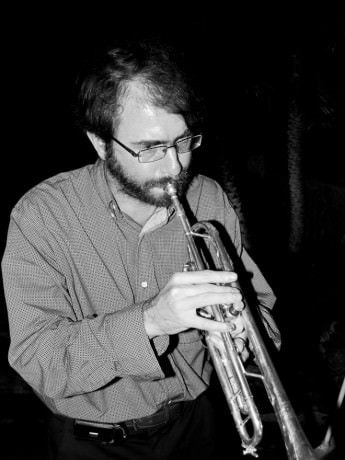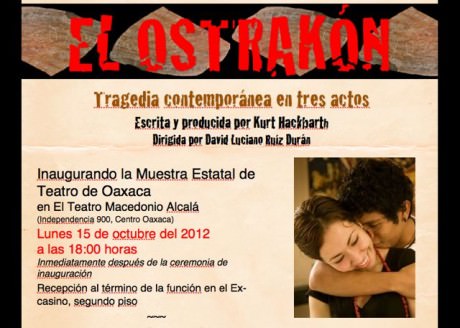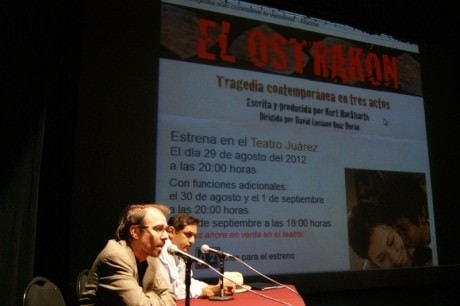Kurt Hackbarth’s new play, El Ostrakon: A Tragedy in Three Acts, which launched Oaxaca’s recent theater festival, examines quotidian forms of oppression: the education system, organized religion, government, and the financial and medical industries. Gabriel, an innocent who falls in love with a girl in his class, finds his love and his life ripped apart by the strictures of institutions he cannot fight, all embodied in one actor/narrator who is clearly the Man. Gabriel does try to fight, in the end—he shoots the Man but finds it impossible to kill him. As for Gabriel, he is thrown from the stage, ostracized, in exile.
The play, a successful blend of farce and tragedy, suggests rather bleak prospects for revolution: struggle is pointless, exile the only escape. But Hackbarth’s life belies that message. Raised in an achievement-driven atmosphere in Connecticut, he left the East Coast for Mexico thirteen years ago. Foregoing a more conventional career, he made his home in Oaxaca and began to write. Exile, perhaps. But he can’t quit fighting the system.
Finding the Mexican education system overly authoritarian, he helped start a Waldorf school—Mexico’s first—four years ago. He had no children himself. But other people’s kids, in his view, needed an alternative. On learning that Oaxacans had no opportunity to study literature formally after secondary school, he began teaching American literature courses, in Spanish, at different community gathering spaces. He followed these up with writing workshops.
If he left the rat race behind, he is succeeding as if he hadn’t. At 37, he has published a book of poetry, Man with Luggage, in English, and he has a book of short stories, Interrumpimos Este Programa (in Spanish), forthcoming from Ficticia press.
Oaxaca, a mid-sized town snuggled in a high mountain valley in southern Mexico, may have its challenges, as far as theater goes—its theater tradition and audience base are still developing and there are few, if any, play development opportunities along the lines of workshops or labs. But Hackbarth looks at the upside: “You can do things.” The first two plays he has ever written have been produced at the city’s best theaters. “In what other city would that ever happen?” he asks. He received a sizable government grant to produce his first play, La [Medio] Diezmada, and El Ostrakon was selected to headline the Oaxaca Theater Festival.
Unlike others writing and producing plays in Oaxaca, Hackbarth is not part of a theater group. He is set on doing things differently. “At first it was hard to get people to show up for casting calls, just because they’re not used to them. ‘What group are you with?’ people would ask me.” But they did come. And the acting was first rate, a considerable accomplishment you when take into account that the actors were not only rehearsing but also building the set. (The director, for his part, ran the lights).

In the context of Oaxacan society, El Ostrakon has certain resonances. Hackbarth wasn’t thinking about immigration when he wrote the play, but “in a sense, living in Mexico for the poor is a constant exile,” he acknowledges, “a constant leaving, sometimes coming back and leaving again and sometimes never coming back. . . The minimum wage is 7 pesos 67 centavos an hour. One can imagine that that’s basically what Gabriel would have been earning at his sweeping job, and he’s saddled with that debt at the other end.”
The resistance in Oaxaca in 2006 also comes to mind, inevitably. Hackbarth was involved in the protests. The repression that followed, in which 28 people were shot to death and many others wounded, arrested, and disappeared, may have contributed to the play’s pessimistic argument. But Hackbarth isn’t done fighting. Part of the point of the play is to lay bare the need for change.
If exile was what Hackbarth needed in order to develop as a writer, he is bent on a kind of homecoming: he would like to take El Ostrakon to Spanish-language theaters in the United States. An artistically interesting, ambitious, and important play, it could conceivably find a good audience there. If taking up arms against the Man is useless, well, Hackbarth at least wants to have a good, long conversation with him.
LINKS
Meet the cast.
Here’s an English synopsis.






